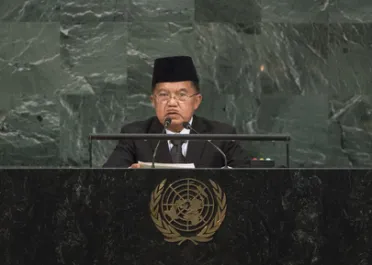Statement
Statement summary
Mr. JUSUF KALLA, Vice-President of Indonesia, said peace was never a given, but must be developed and nurtured. “We must work towards creating a global ecosystem of peace and stability,” he said, emphasizing that such an effort would require dialogue, inclusiveness, the peaceful settlement of disputes and the non-use of force. Emphasizing Indonesia’s contribution to United Nations peacekeeping, and its membership in the Peacebuilding Commission, he said his country would always be ready to be part of a global solution to conflicts. Sustainable peace required a global culture of prevention, he said, underscoring the importance of a strong partnership between the United Nations, regional organizations and national Governments.
Palestine was at the heart of Indonesia’s foreign policy, he said, calling for a fresh, sustainable and innovative approach that would bring about a two-State solution. A decent life for all people must be a global goal, with synergies between sustaining peace and the development agenda. Global commitments including the Sustainable Development Goals and the Paris Agreement must be translated into concrete action, with adequate funding, technical assistance, capacity-building and technology transfers for least developed and developing countries. It was also important to support regions such as Africa, which had huge potential and which had undertaken great reforms towards sustainable development.
Synergy between sustaining peace and the development agenda also required a society that was just, inclusive and respectful of human rights, he continued. There should be no man-made humanitarian crises. Indonesia shared the international community’s concern about developments in Rakhine State, he said, adding that his country had proposed a “4+1” formula to the Government of Myanmar, placing the needs and welfare of the people at the centre. He called for immediate access to humanitarian assistance and implementation of the recommendations of the Advisory Committee on Rakhine State.
Despite what the sceptics believed, climate change was real, he said. With more than 17,000 islands, Indonesia was feeling the impact of changing weather patterns and rising sea levels. Climate change would affect Indonesia’s sustainable development and even its survival. He said his country was fully committed to the Paris Agreement and called on all countries to implement their obligations under that instrument. Turning to terrorism, he said the key to tackling it was through addressing its root causes, including extreme poverty, illiteracy and massive youth unemployment. Indonesia used a combination of hard and soft powers to address terrorism, radicalism and violent extremism, including a comprehensive programme to de-radicalize and reintegrate those who had “gone to the dark side”. In an age of social media, terrorism was like a fast-spreading cancer that could only be eradicated through global cooperation and a comprehensive approach, he said.
Full statement
Read the full statement, in PDF format.
Photo

Previous sessions
Access the statements from previous sessions.
